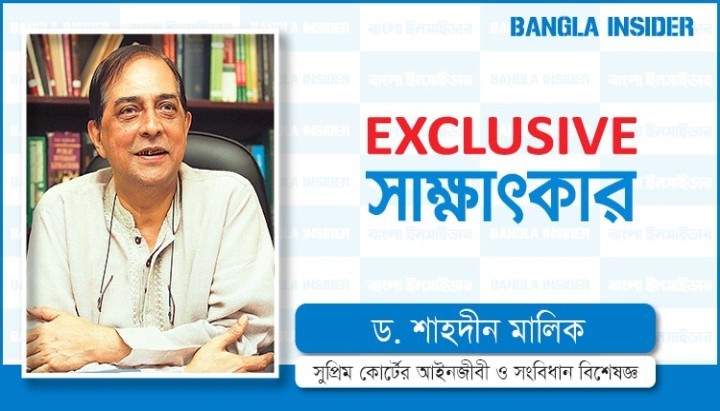
ইনসাইড টক
"No one understands ABC of law, I am tired of explaining"
প্রকাশ: 28/01/2022

Dr. Shahdeen Malik is a prominent legal expert at the Supreme Court, a constitutional specialist, and a human rights advocate. He serves as the Director of the School of Law at Brac University and is a trustee on the board of the Center for Policy Dialogue (CPD). Additionally, he is a member of the central steering committee for Citizens for Good Governance, a civil society platform dedicated to promoting transparency and accountability. In 2013, he served as a legal advisor to the Bangladesh Election Commission. His extensive expertise in election law and contemporary politics has led to an in-depth conversation with our Staff correspondent, Md. Oliul Islam.
Bangla
Insider: How do you perceive the recent formation
of the Election Commission under the new law?
Dr.
Shahdeen Malik: There has been much debate
surrounding the formation of the Election Commission under the new law. In all
laws, the first section is titled "Title." I recently mentioned that
the title of this law should be "Ensuring the Certification of Desired
Outcomes in Upcoming Elections Act." This would ensure that the government
remains honest in the forthcoming elections. This has indeed been implemented,
and we now have the "Certification of Desired Outcomes in Upcoming
Elections Act."
Bangla
Insider: Why do you believe that the title of the
law should be "Ensuring the Certification of Desired Outcomes in Upcoming
Elections Act"?
Dr.
Shahdeen Malik: The ABCs of the law are not
understood by anyone. Even I am
tired of explaining. Similar laws exist for institutions
like the Anti-Corruption Commission, the National Human Rights Commission, and
the Information Commission. In all these institutions, key appointments are
made by high court judges, Supreme Court judges, and members of the Cabinet Division.
Bangla
Insider: What are the issues with this approach?
Dr.
Shahdeen Malik: Justice Md. Abdul Matin, a retired
judge from the Appellate Division of the Supreme Court, recently stated that he
was a member of the Search Committee for the appointment of the first chairman
of the Anti-Corruption Commission, as well as the subsequent Search Committees
for the appointment of members to the Human Rights Commission and the
Information Commission. They received several names and CVs from the Ministry
of Law for these appointments. Justice Matin is a senior figure and he
revealed these facts to a local media outlet.
Bangla
Insider: But the Law Minister has said that there
is no difference in the law?
Dr.
Shahdeen Malik: The Law Minister hasn't read the law
we drafted. We proposed this law in 2011, specifically for the Shamsul Huda
Commission. Our country's main law book contains 40,000 pages. What I proposed
for the Shamsul Huda Commission 10 years ago hasn't been placed on the table
yet. Journalists can verify this if they wish. Then they can see where the
differences lie.
Bangla
Insider: Regarding the formation of the Election
Commission, do you see any consensus for unity and any opportunities?
Dr.
Shahdeen Malik: The law has now been passed, so
there is no room for suggestions. The political parties will decide how they
utilize this law. We, as civil society, analyzed the law thoroughly and
proposed changes to ensure transparency in the appointment process. We will
know who is being appointed and why. Unfortunately, the law does not include
provisions for transparency. The law has now been passed, and there is no going
back. In the past, I mentioned that the Digital Security Act should be called
the "Freedom Control Act" to make it more transparent.
Bangla
Insider: The national election at the end of 2023
or on January 24 is approaching. Do you foresee any uncertainties?
Dr.
Shahdeen Malik: I have some suggestions for the
upcoming election. It was also a part of the fourth amendment to our
constitution. In March 1973, our first national parliament election was held,
and according to the constitution, the term for this parliament was five years
until March 1978. But in the 1975 fourth amendment, it was extended for another
five years beyond that date. This historical example exists in our country. Now
the situation is moving in that direction. The Union Parishad and Upazila
Parishad Act states that the term for Union Parishad and Upazila Parishad
elections is five years. By amending it to ten years without any fuss, the
issue can be resolved!
প্রধান সম্পাদকঃ সৈয়দ বোরহান কবীর
ক্রিয়েটিভ মিডিয়া লিমিটেডের অঙ্গ প্রতিষ্ঠান
বার্তা এবং বাণিজ্যিক কার্যালয়ঃ ২/৩ , ব্লক - ডি , লালমাটিয়া , ঢাকা -১২০৭
নিবন্ধিত ঠিকানাঃ বাড়ি# ৪৩ (লেভেল-৫) , রোড#১৬ নতুন (পুরাতন ২৭) , ধানমন্ডি , ঢাকা- ১২০৯
ফোনঃ +৮৮-০২৯১২৩৬৭৭